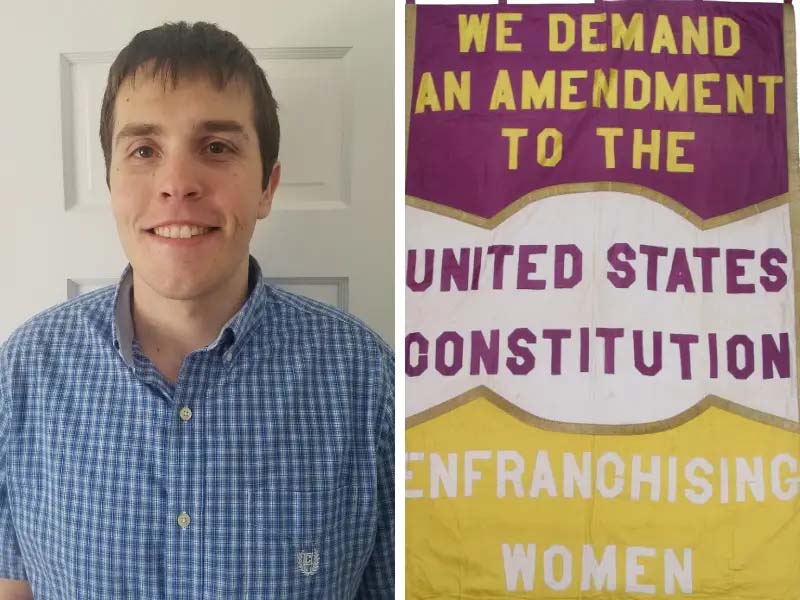History Faculty Vote to Use Departmental Funds for Graduate Student Tuition: M.A. Student Will Tharp Explains the Importance, Reflects on his Grad Program Experience
April 20, 2021

The VCU Graduate School recently terminated tuition waivers for graduate teaching assistantships in all M.A. programs to take effect in Fall 2021. This meant that although the College of Humanities and Sciences will continue to pay stipends, that teaching assistants in the department would, for the first time in our program, be responsible for their own tuition. Concerned about prospects of recruiting a diverse range of competitive students, the department voted to use $10,000 from our operating budget to offer partial tuition funding to GTAs. An anonymous alumnus donor helped make this funding possible, and we plan to kick off a larger fundraising campaign in Fall ’21. I talked with M.A. student Will Tharp, who is graduating in May ’21, about the importance of robust graduate funding in his experience at VCU.
Born and raised in the Richmond area, Tharp graduated from Godwin High School. He received a B.A. from University of Lynchburg’s Westover Honors College majoring in history and minoring in museum studies and graduating in three years.
Tharp says, “The GTA offer played a huge role in my decision to attend VCU. I received offers from other schools, such as William and Mary and UNC Greensboro, but VCU… provided the most funding by far. The GTA position was also attractive to me because it gave me a chance to essentially take an additional class (can't go wrong with more history) while also learning more about how professors go about conducting a class. It has been nice professional development that I'm not sure I would have gotten if I had chosen another program.”
During his time in the program, Tharp worked as an education intern at the Library of Virginia, where he created a self-guided tour of the We Demand: Women’s Suffrage in Virginia exhibit and contributed to the Document Bank of Virginia.
He placed third in the VCU Graduate School’s 3-Minute Thesis Competition for his presentation “Savage and Bloody Footsteps Through the Valley: The Wyoming Massacre in the American Imagination.” Tharp is working under the supervision of Prof. Carolyn Eastman, and has also presented his research at the Virginia Consortium of Early Americanists and the James A. Barnes Graduate Student History Conference.
“My thesis is about the historical remembrance of a brutal frontier battle during the Revolution called the Battle of Wyoming or the Wyoming Massacre,” Tharp explains. “While not much remembered today, earlier Americans were intimately familiar with this battle--it formed part of our early Revolutionary mythology. It occurred in July 1778 between Patriots and a force of British, Loyalist, and Native American raiders in the Wyoming Valley of Pennsylvania (not to be confused with the state of Wyoming--which takes its name from this valley). I reconstruct what actually occurred at the battle and then trace how a myth of massive proportions quickly took hold of the public's understanding” in the immediate aftermath of battle, during the War of 1812, and again in the Jacksonian era. “All in all, it's a tale of historical distortion that starts in the Revolution but has a major, if understudied, impact on the American culture and political identity in the eighteenth and nineteenth centuries.”
Tharp recounts a few highlights from his classes in the program. One, presenting his ideas to the Virginia Museum of History and Culture’s senior director of curatorial affairs Andy Talkov to reimagine the Confederate Military Murals gallery in the Controversies in Public History course. “I relished the opportunity to present my ideas about how to improve their gallery to someone at the museum, and it was awesome to hear that he would consider some of my suggestions,” says Tharp. Two, meeting at the Lee Monument for the Material Culture class. “We had just finished a work on Civil War era monuments, and it was interesting to see how Monument Avenue had quickly changed. It certainly reminded me that we are living through very historic times ourselves.” And three, a trip (pre-covid) to meet with historians at William & Mary in the Revolutionary Era readings course. “It was a great experience being with a bunch of different historians in a constructive environment,” he recounts.
After graduation, Tharp plans to celebrate, search for employment in the public history, museum or education fields, and consider returning to graduate school for a Ph.D.
Congratulations, and good luck!